Avoid getting scammed by fake "Bitcoin Prize Draw" websites
Phishing/ScamAlso Known As: "Bitcoin Prize Draw" scam website
Get free scan and check if your device is infected.
Remove it nowTo use full-featured product, you have to purchase a license for Combo Cleaner. Seven days free trial available. Combo Cleaner is owned and operated by RCS LT, the parent company of PCRisk.com.
What kind of scam is "Bitcoin Prize Draw"?
"Bitcoin Prize Draw" is a scam intended to trick victims into sending funds to scammers. Our research team discovered this scheme while investigating a spam email. The file attached to the scam-promoting email claimed that the recipient had won a Bitcoin cryptocurrency prize. The attachment redirected to a similar page, which finally landed on a website requesting a tax payment.
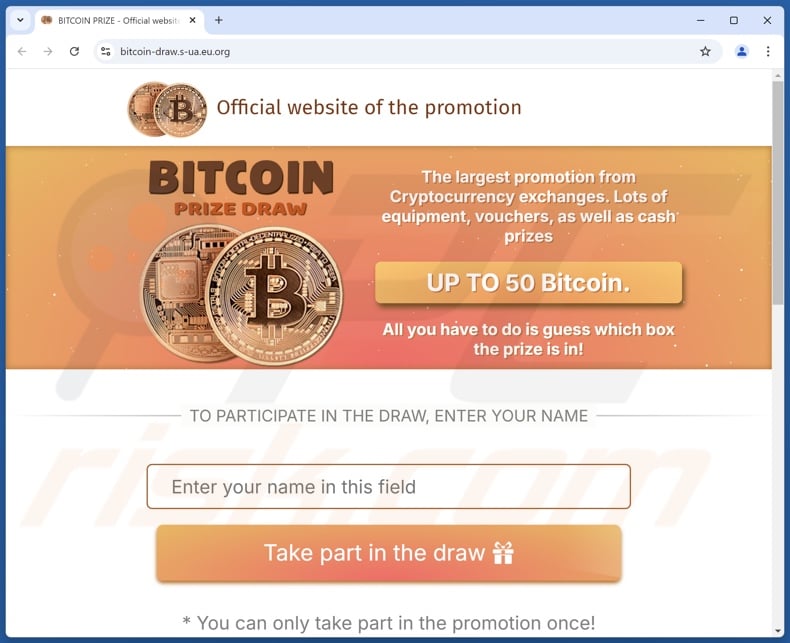
IMPORTANT NOTE: We do not review crypto projects, please do your own research when investing money.
Federal Trade Commission (FTC) states that since the start of 2021, more than 46,000 people have reported losing over $1 billion in crypto to scams – that's about one out of every four dollars reported lost, more than any other payment method.
"Bitcoin Prize Draw" scam overview
We discovered the "Bitcoin Prize Draw" scam while examining a spam email with a subject claiming that a financial transfer is pending confirmation. Interestingly, the body of the letter concerns a different topic; it states that the recipient's personal account will be deleted.
The file attached to the email is a PDF document announcing that the user has won a 0.75 BTC (Bitcoin cryptocurrency) prize (note that the amount may vary between variants). The winner is instructed to contact an operator to claim their winnings. Clicking on the image in the PDF redirects to a webpage with a similar design.
Interacting with this site redirects to yet another one. This website is presented as the "largest promotion" held by unspecified cryptocurrency exchanges. It promises various rewards, including equipment, vouchers, cash prizes, and up to 50 BTC. The user will have to select a box, and they might win a reward.
The first step for participating is to enter their name in the appropriate field. The user is then presented with multiple images of gift boxes, and they have three attempts to win a prize. Clicking any of them results in a supposed win, and the winner is instructed to press the button below to contact an operator for claiming the 0.75 BTC prize (amount may vary).
After a fake wait period, a connection is established with an operator, and a bogus chat window is displayed. The messages congratulate the user and instruct them to click the "I hereby give my consent to receive the prize" button. The sum is then prepared, and the user is requested to provide their details.
The next page requires the winner to enter their cryptocurrency wallet address. The user is informed that tax must be paid to the IRS (Internal Revenue Service); the amount is listed as 73 USD (sum may vary). The scam redirects to a different website that asks the victim to provide their personal information and instructs them on buying and sending Bitcoins (in order to pay the bogus taxes).
Thus, by sending money to these scammers, victims experience financial loss. It must be mentioned that due to the nearly untraceable nature of cryptocurrency transactions – they cannot be reversed. Hence, victims of this scam cannot recover the stolen funds.
| Name | "Bitcoin Prize Draw" scam website |
| Threat Type | Phishing, Scam, Social Engineering, Fraud |
| Fake Claim | User has won a Bitcoin prize and needs to pay taxes on it. |
| Related Domains | bitcoin-draw.s-ua.eu[.]org, bitcheknow[.]top, biltonfast[.]top |
| Detection Names | Combo Cleaner (Malware), Fortinet (Phishing), G-Data (Malware), Kaspersky (Phishing), Sophos (Phishing), Full List Of Detections (VirusTotal) |
| Serving IP Address | 45.130.41.101 |
| Distribution methods | Compromised websites, social media spam, rogue online pop-up ads, potentially unwanted applications. |
| Damage | Monetary loss |
| Malware Removal (Windows) |
To eliminate possible malware infections, scan your computer with legitimate antivirus software. Our security researchers recommend using Combo Cleaner. Download Combo CleanerTo use full-featured product, you have to purchase a license for Combo Cleaner. 7 days free trial available. Combo Cleaner is owned and operated by RCS LT, the parent company of PCRisk.com. |
Similar scam examples
We have investigated countless online scams; "Binance Bitcoin Payout" is one that shares many similarities with "Bitcoin Prize Draw", while "Fake BitPay Wallet", "Coca Cola Survey", "Valorant Skin Giveaway", "Counter Strike Giveaway", "Riot Games & Twitch Giveaway" – are some examples of schemes using reward-themed lures.
The Internet is rife with deceptive and malicious content. While the appearance of online scams and the mechanisms they use can differ greatly, their end-goal is the same – to generate revenue at victims' expense.
Due to how prevalent scams are on the Web and how well-crafted they can be – we strongly recommend exercising caution when browsing.
How did I open a scam website?
At the time of research, we discovered the "Bitcoin Prize Draw" scam promoted by a spam email. However, the subjects and bodies of these letters can differ, and other techniques could be used to endorse this scheme.
Generally, online scams are promoted by different types of spam (e.g., emails, DMs/PMs, SMSes, social media/ forum posts, browser notifications, etc.), webpages using rogue advertising networks, malvertising (intrusive advertisements), typosquatting (misspelled URLs), and adware.
How to avoid visiting scam websites?
We advise vigilance when browsing since the Internet is rife with deceptive and dangerous content. Therefore, be wary of advertisements, sites, and messages making promises that sound too good to be true. Always pay attention to URLs and enter them carefully.
Do not use websites offering pirated programs/media or other dubious services (e.g., illegal streaming/downloading, Torrenting, etc.), as these webpages typically employ rogue advertising networks. Do not permit suspicious pages to deliver browser notifications; instead, ignore or deny these requests (i.e., press "Block", "Block Notifications", etc.).
Approach incoming emails and other messages with care; do not open attachments or links found in suspect/irrelevant mail. Download only from official/verified sources and treat installations with caution (e.g., read terms, study options, use "Custom/Advanced" settings, and opt out of supplementary apps, extensions, etc.) – to prevent bundled/dangerous software from infiltrating the system.
If your computer is already infected, we recommend running a scan with Combo Cleaner Antivirus for Windows to automatically eliminate all threats.
The appearance of "Bitcoin Prize Draw" scam (GIF):
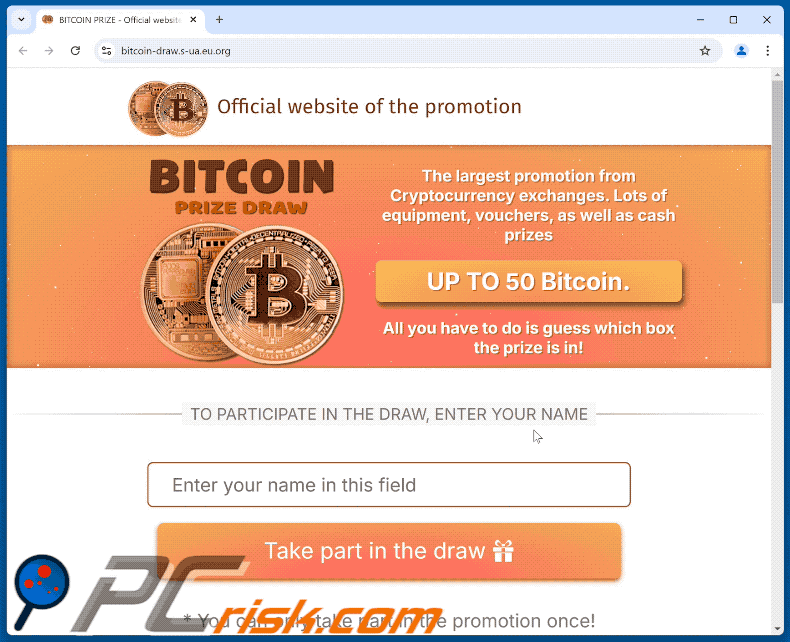
Screenshot of a spam email promoting the "Bitcoin Prize Draw" scam:
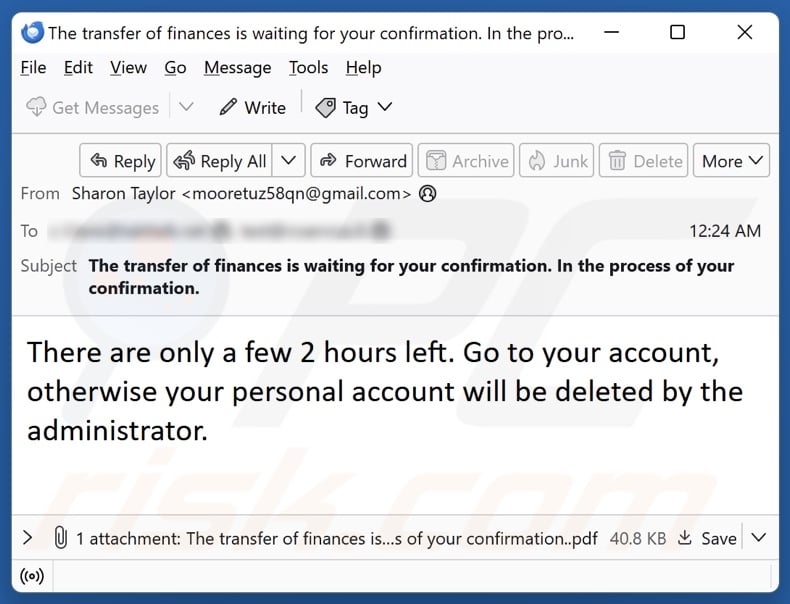
Text presented in this email:
Subject: The transfer of finances is waiting for your confirmation. In the process of your confirmation.
There are only a few 2 hours left. Go to your account, otherwise your personal account will be deleted by the administrator.
Screenshot of the file attached to this spam email:
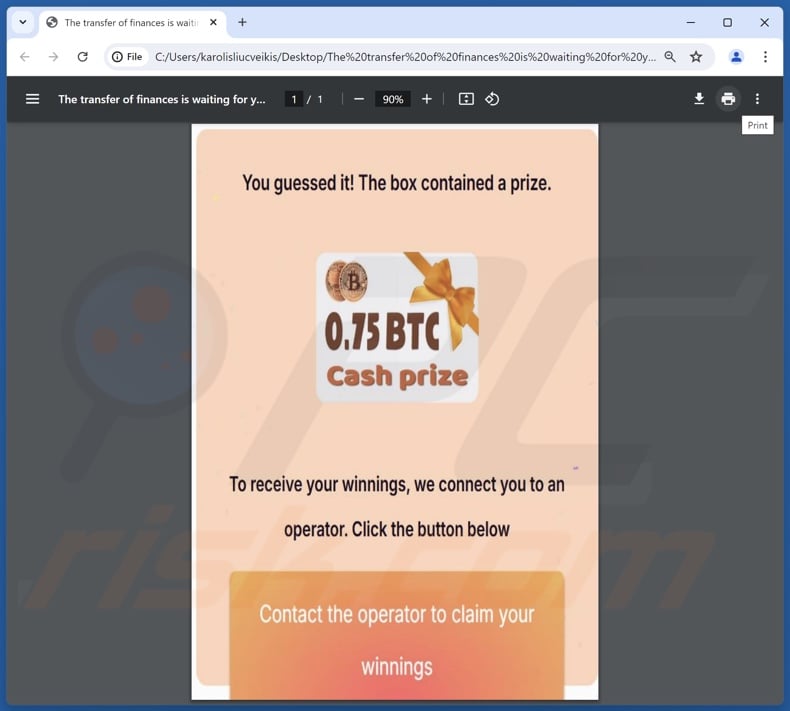
Screenshot of the deceptive website promoted by this attachment:
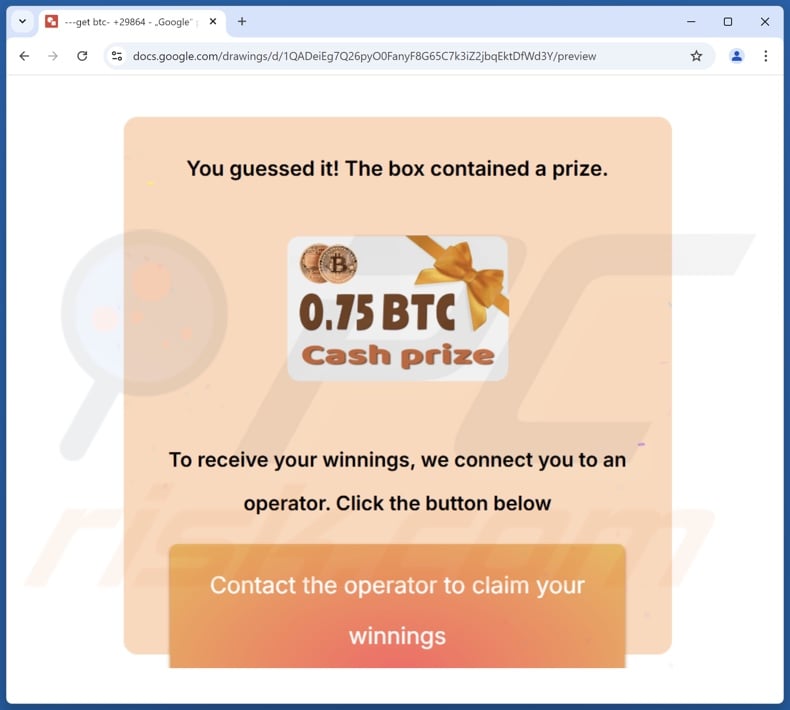
Another example of a spam email promoting Bitcoin Prize Draw scam:
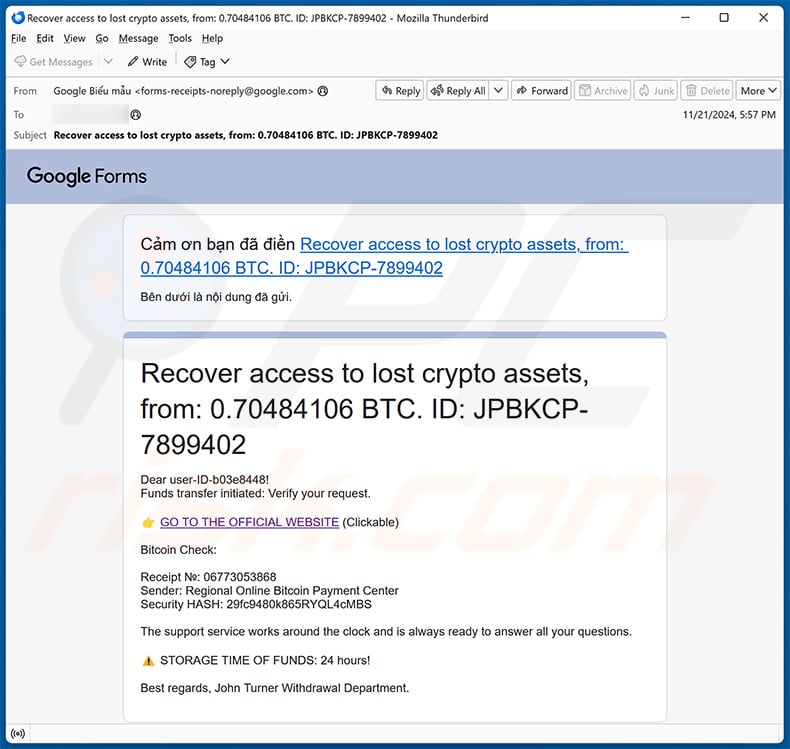
Text presented within:
Subject: Recover access to lost crypto assets, from: 0.70484106 BTC. ID: JPBKCP-7899402
Recover access to lost crypto assets, from: 0.70484106 BTC. ID: JPBKCP-7899402
Dear user-ID-b03e8448!
Funds transfer initiated: Verify your request.GO TO THE OFFICIAL WEBSITE (Clickable)
Bitcoin Check:
Receipt : 06773053868
Sender: Regional Online Bitcoin Payment Center
Security HASH: 29fc9480k865RYQL4cMBSThe support service works around the clock and is always ready to answer all your questions.
STORAGE TIME OF FUNDS: 24 hours!
Best regards, John Turner Withdrawal Department.
Instant automatic malware removal:
Manual threat removal might be a lengthy and complicated process that requires advanced IT skills. Combo Cleaner is a professional automatic malware removal tool that is recommended to get rid of malware. Download it by clicking the button below:
DOWNLOAD Combo CleanerBy downloading any software listed on this website you agree to our Privacy Policy and Terms of Use. To use full-featured product, you have to purchase a license for Combo Cleaner. 7 days free trial available. Combo Cleaner is owned and operated by RCS LT, the parent company of PCRisk.com.
Quick menu:
- What is "Bitcoin Prize Draw" scam website?
- How to identify a pop-up scam?
- How do pop-up scams work?
- How to remove fake pop-ups?
- How to prevent fake pop-ups?
- What to do if you fell for a pop-up scam?
How to identify a pop-up scam?
Pop-up windows with various fake messages are a common type of lures cybercriminals use. They collect sensitive personal data, trick Internet users into calling fake tech support numbers, subscribe to useless online services, invest in shady cryptocurrency schemes, etc.
While in the majority of cases these pop-ups don't infect users' devices with malware, they can cause direct monetary loss or could result in identity theft.
Cybercriminals strive to create their rogue pop-up windows to look trustworthy, however, scams typically have the following characteristics:
- Spelling mistakes and non-professional images - Closely inspect the information displayed in a pop-up. Spelling mistakes and unprofessional images could be a sign of a scam.
- Sense of urgency - Countdown timer with a couple of minutes on it, asking you to enter your personal information or subscribe to some online service.
- Statements that you won something - If you haven't participated in a lottery, online competition, etc., and you see a pop-up window stating that you won.
- Computer or mobile device scan - A pop-up window that scans your device and informs of detected issues - is undoubtedly a scam; webpages cannot perform such actions.
- Exclusivity - Pop-up windows stating that only you are given secret access to a financial scheme that can quickly make you rich.
Example of a pop-up scam:

How do pop-up scams work?
Cybercriminals and deceptive marketers usually use various advertising networks, search engine poisoning techniques, and shady websites to generate traffic to their pop-ups. Users land on their online lures after clicking on fake download buttons, using a torrent website, or simply clicking on an Internet search engine result.
Based on users' location and device information, they are presented with a scam pop-up. Lures presented in such pop-ups range from get-rich-quick schemes to fake virus scans.
How to remove fake pop-ups?
In most cases, pop-up scams do not infect users' devices with malware. If you encountered a scam pop-up, simply closing it should be enough. In some cases scam, pop-ups may be hard to close; in such cases - close your Internet browser and restart it.
In extremely rare cases, you might need to reset your Internet browser. For this, use our instructions explaining how to reset Internet browser settings.
How to prevent fake pop-ups?
To prevent seeing pop-up scams, you should visit only reputable websites. Torrent, Crack, free online movie streaming, YouTube video download, and other websites of similar reputation commonly redirect Internet users to pop-up scams.
To minimize the risk of encountering pop-up scams, you should keep your Internet browsers up-to-date and use reputable anti-malware application. For this purpose, we recommend Combo Cleaner Antivirus for Windows.
What to do if you fell for a pop-up scam?
This depends on the type of scam that you fell for. Most commonly, pop-up scams try to trick users into sending money, giving away personal information, or giving access to one's device.
- If you sent money to scammers: You should contact your financial institution and explain that you were scammed. If informed promptly, there's a chance to get your money back.
- If you gave away your personal information: You should change your passwords and enable two-factor authentication in all online services that you use. Visit Federal Trade Commission to report identity theft and get personalized recovery steps.
- If you let scammers connect to your device: You should scan your computer with reputable anti-malware (we recommend Combo Cleaner Antivirus for Windows) - cyber criminals could have planted trojans, keyloggers, and other malware, don't use your computer until removing possible threats.
- Help other Internet users: report Internet scams to Federal Trade Commission.
Frequently Asked Questions (FAQ)
What is an online scam?
Online scams are a type of deceptive content hosted on the Web; it aims to trick users into performing certain actions. For example, victims can be enticed into sending money to scammers, disclosing sensitive information, connecting digital wallets to crypto drainers, buying products, downloading/installing software, subscribing to services, and so on.
What is the purpose of online scams?
The purpose of online scams is to generate revenue for scammers. Profit can be made by abusing/selling vulnerable information, promoting content (e.g., websites, software, products, services, etc.), obtaining funds through deception, and spreading malware.
I have lost digital assets to an online scam, can I get my money back?
Cryptocurrency transactions are nearly untraceable – therefore, they cannot be reversed.
Why do I encounter online scams?
Online scams are most commonly endorsed via spam (e.g., emails, PMs/DMs, SMSes, social media/ forum posts, browsing notifications, etc.), sites utilizing rogue advertising networks, intrusive ads, mistyped URLs, and adware.
Will Combo Cleaner protect me from online scams?
Combo Cleaner can scan visited websites and detect deceptive/malicious pages. Therefore, should you happen upon such a webpage – you will be immediately warned, and further access to it will be blocked.
Share:

Tomas Meskauskas
Expert security researcher, professional malware analyst
I am passionate about computer security and technology. I have an experience of over 10 years working in various companies related to computer technical issue solving and Internet security. I have been working as an author and editor for pcrisk.com since 2010. Follow me on Twitter and LinkedIn to stay informed about the latest online security threats.
PCrisk security portal is brought by a company RCS LT.
Joined forces of security researchers help educate computer users about the latest online security threats. More information about the company RCS LT.
Our malware removal guides are free. However, if you want to support us you can send us a donation.
DonatePCrisk security portal is brought by a company RCS LT.
Joined forces of security researchers help educate computer users about the latest online security threats. More information about the company RCS LT.
Our malware removal guides are free. However, if you want to support us you can send us a donation.
Donate
▼ Show Discussion